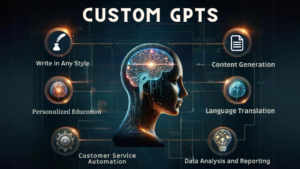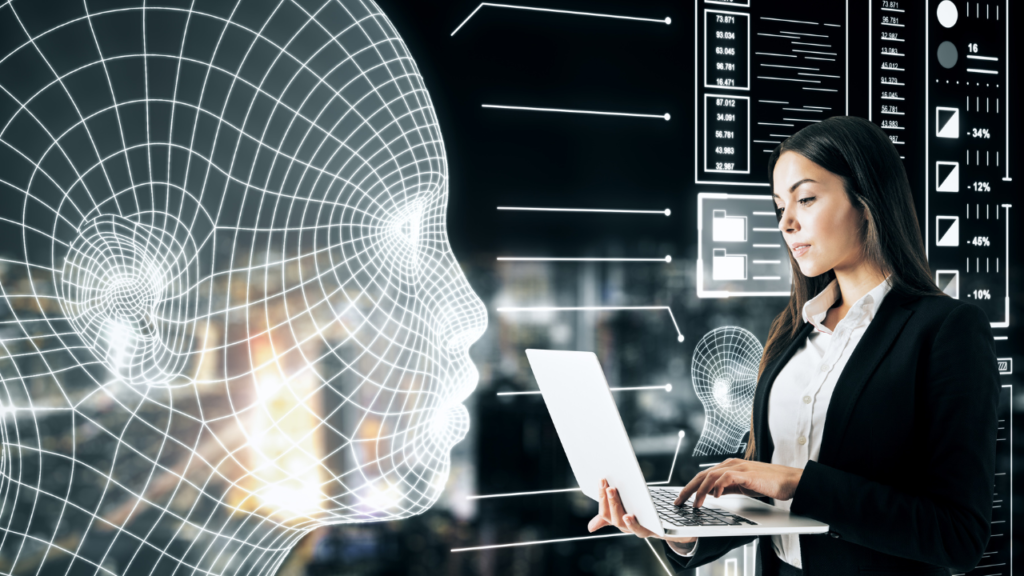Contents
Understanding Custom GPTs
In the rapidly evolving digital era, the quest for personalization has led to a significant leap in artificial intelligence (AI) technologies. Amongst these, Generative Pre-trained Transformers, or GPTs, have emerged as a beacon of innovation, propelling industries towards a future where AI isn’t just smart — it’s personalized. But what exactly are custom GPTs, and how do they weave their personalized AI magic across various domains? This article embarks on a journey to demystify custom GPTs, exploring their transformative impact on technology, business, and beyond.
 What Are GPTs?
What Are GPTs?
Generative Pre-trained Transformers (GPTs) are a class of AI designed to generate text that mimics human language. From composing poetry to coding, GPTs have demonstrated an uncanny ability to perform a wide array of language tasks. However, as impressive as these models are, they’re often just the starting point for many organizations.
The Birth of Customization in GPTs
Custom GPTs represent the next step in AI’s evolution. They are bespoke models, fine-tuned and tailored to understand the nuances of specific industries, brands, or even individual users. These models are trained on specialized datasets, allowing them to operate within a certain context with greater accuracy and relevance.
The customization of GPTs is akin to a master tailor crafting a suit. Just as the tailor adjusts every stitch and seam to fit the unique contours of their client, engineers and data scientists fine-tune custom GPTs to align closely with a company’s lexicon, customer service protocols, or the specialized knowledge base of a professional field. This high level of personalization ensures that when a custom GPT model interacts with users or tackles industry-specific problems, it does so with an understanding that is both deep and contextual. The result is an AI that not only speaks the language of the sector it serves but also reflects the ethos and values of the brand it represents, delivering a user experience that is not just functional but also resonant and engaging.
The Tech Behind the Tailoring 0f Custom GPTs
 At the heart of custom GPTs is machine learning (ML), where models are ‘taught’ using large amounts of data. What sets custom GPTs apart is their training process, which is focused on a curated dataset, often proprietary, ensuring that the AI model aligns with the unique needs and goals of the user or organization.
At the heart of custom GPTs is machine learning (ML), where models are ‘taught’ using large amounts of data. What sets custom GPTs apart is their training process, which is focused on a curated dataset, often proprietary, ensuring that the AI model aligns with the unique needs and goals of the user or organization.
Delving deeper into the tech behind the tailoring, the creation of custom GPTs employs advanced techniques such as transfer learning and adaptive learning. Transfer learning allows these models to take knowledge from general tasks and apply it to specific, more focused objectives. Adaptive learning further refines this by continuously adjusting to new data inputs, which means a custom GPT can evolve with the organization, becoming more attuned and responsive to its changing requirements. This sophisticated infrastructure is capable of processing the intricacies of language at an immense scale. Thus, custom GPTs are not static tools; they are dynamic entities that grow smarter and more efficient, echoing the rhythms of the environments they are designed to serve.
Custom GPTs in the Tech Industry
Custom AI for Product Innovation
 Tech companies are leveraging custom GPTs to innovate and improve product features. Custom GPTs lead product differentiation, whether in personalized fitness coaching or individualized financial advice.
Tech companies are leveraging custom GPTs to innovate and improve product features. Custom GPTs lead product differentiation, whether in personalized fitness coaching or individualized financial advice.
Custom GPTs drive innovation beyond functionality, creating unique user experiences. In e-commerce, they power recommendation engines for personalized shopping journeys. In entertainment, they curate content based on viewer preferences, transforming passive viewing into interactive experiences. These AI systems redefine the technology-user relationship, setting a new standard for personalized digital interaction.
Case Studies: Giants Embracing Customization
Tech giants like Google and Microsoft have been early adopters, using custom GPTs to refine search algorithms and enhance natural language processing capabilities. These case studies showcase the tangible benefits of investing in custom AI solutions.
 Beyond the realms of search and office productivity, GPTs have been instrumental in pioneering developments in other sectors.
Beyond the realms of search and office productivity, GPTs have been instrumental in pioneering developments in other sectors.
For instance, Amazon optimizes logistics with custom GPTs, predicting demand and automating customer service. In healthcare, IBM’s Watson aids diagnosis and treatment suggestions, supporting medical professionals. These cases demonstrate the GPTs’ versatility and strategic advantage, setting industry benchmarks for AI-driven efficiency.
The Impact of Custom GPTs on Business Operations
Streamlining Processes with AI
Businesses of all sizes are turning to GPTs to streamline operations. By handling routine inquiries or generating reports, these AI systems free up human workers to focus on more complex tasks, increasing overall efficiency.
The streamlining effect of GPTs on business processes is both profound and pervasive. They automate administrative tasks like scheduling meetings and managing emails, freeing up time for innovation. In customer management, they personalize interactions at scale, boosting productivity and enabling a shift towards a collaborative AI-human work environment.
Decision-Making with a Digital Advisor
 Custom GPTs act as digital advisors, providing businesses with insights and recommendations based on data-driven analysis. This high-level application of AI aids in strategic decision-making and can significantly impact a company’s trajectory.
Custom GPTs act as digital advisors, providing businesses with insights and recommendations based on data-driven analysis. This high-level application of AI aids in strategic decision-making and can significantly impact a company’s trajectory.
They act as strategic digital advisors, analyzing vast datasets and contextualizing information within a business’s framework. They offer tailored forecasts and insights, guiding decision-making across industries like finance and retail. This data-driven approach marks a shift towards AI-enabled governance, enhancing business strategy and growth.
Custom GPTs & Real-World Efficiency Gains
From small startups to multinational corporations, the implementation of custom GPTs has led to real-world efficiency gains. They have helped businesses to optimize workflows, improve customer engagement, and even drive innovation in product development.
The tangible benefits of custom GPTs in driving real-world efficiency are as varied as they are significant. In the service industry, these AI models enhance booking systems and resource allocation, leading to customer satisfaction and retention. They accelerate code generation and debugging, fostering innovation and shaping the future of work for agile businesses, showcasing AI’s potential.